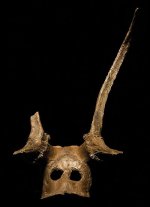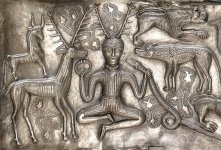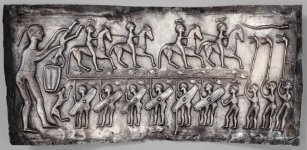Murphy
cat malogen
Triggered!
Precursors to monuments in nw Europe ie Mesolithic pre-agriculture but extends to coastal sites all around the world heavy in shellfish deposits. Resource hubs as points in a seasonal round of tasks and easy protein in tough winters
Ephemeral too if you trace footprints along seasonal Mesolithic coastal routes, eg you can trace adults walking tide lines with kids running and playing around them dotted up and down the Severn estuary , ephemeral as in revealed at low tides and washed away as the tide turns back in once exposed
Good preservation around coasts with soil and sand reducing decay from oxygen exposure. Likewise inland with the classic hunter gatherer lakeside encampment of Star Carr in what’s now Yorkshire
 www.starcarr.com
www.starcarr.com
Famous for its antler headdress, the holes aren’t eye holes but for tying it securely to the head, has a certain presence to it

Precursors to monuments in nw Europe ie Mesolithic pre-agriculture but extends to coastal sites all around the world heavy in shellfish deposits. Resource hubs as points in a seasonal round of tasks and easy protein in tough winters
Ephemeral too if you trace footprints along seasonal Mesolithic coastal routes, eg you can trace adults walking tide lines with kids running and playing around them dotted up and down the Severn estuary , ephemeral as in revealed at low tides and washed away as the tide turns back in once exposed
Good preservation around coasts with soil and sand reducing decay from oxygen exposure. Likewise inland with the classic hunter gatherer lakeside encampment of Star Carr in what’s now Yorkshire
Star Carr | A Mesolithic site in North Yorkshire | Home
Famous for its antler headdress, the holes aren’t eye holes but for tying it securely to the head, has a certain presence to it




